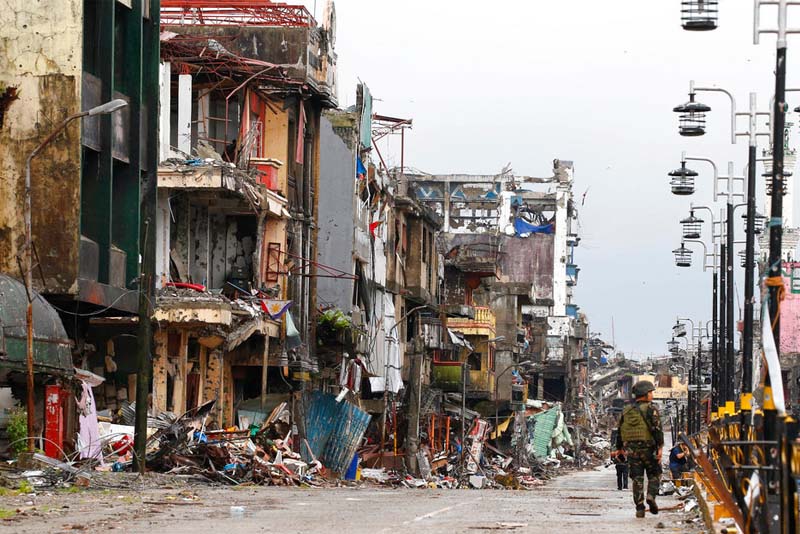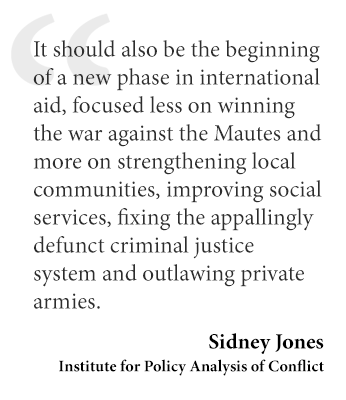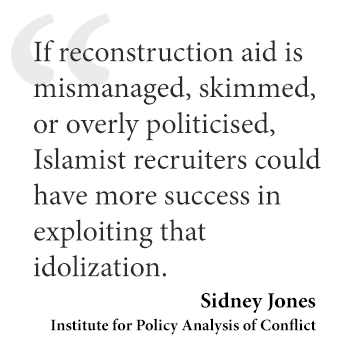Scenarios drawn from death of Marawi siege leaders

Institute for Policy Analysis of Conflict head Sidney Jones warned that President Rodrigo Duterte’s declaration of the liberation of Marawi does not put an end to the crisis in the Southern Philippines as militants could recruit and radicalize those who were displaced by the fighting. She stressed that surviving fighters could recruit displaced young men, especially Maranaos, to produce a new Maranao Islamist insurgency that would evolve over time “into something that more resembles an ethno-nationalist movement than a wing of the global jihad.” AP/Bullit Marquez
MANILA, Philippines — The deaths of top Marawi siege leaders do not signal the end of violent extremism in Mindanao as the threat of extremist group Islamic State still looms in Southeast Asia, the head of the Jakarta-based think tank Institute for Policy Analysis of Conflict said.

Jones warned that President Rodrigo Duterte'sdeclaration of the liberation of Marawi does not put an end to the crisis in the Southern Philippines as militants could recruit and radicalize those who were displaced by the fighting.
"But ISIS has not been wiped out in Southeast Asia and Marawi won't be truly liberated until it is safe enough for some 200,000 displaced residents to return. Yet the contours of ISIS activity will shift as fighting winds down," Jones said.
She stressed that the government should focus on the rehabilitation of the besieged city and its displaced constituents.
"It should also be the beginning of a new phase in international aid, focused less on winning the war against the Mautes and more on strengthening local communities, improving social services, fixing the appallingly defunct criminal justice system and outlawing private armies," Jones said.
Recruiting, radicalization of Muslims in Mindanao
"Whatever happens, the 'liberation' of Marawi does not mean an end to radicalization," Jones warned.
She said the radicalization of Muslims, especially among the youth and those in marginalized sector, is gaining ground but the Philippine government does not seem "to have ever understood how deep the indoctrination was, where it was taking place or how long it had been going on."
Jones also noted that surviving fighters could recruit displaced young men, especially Maranaos, to produce a new Maranao Islamist insurgency that would evolve over time "into something that more resembles an ethno-nationalist movement than a wing of the global jihad."
Defense Secretary Delfin Lorenzana admitted that they have not been paying attention to the "foreign, destructive ideology" but vowed that they will now be addressing this.
On Monday, he announced that the government has already coordinated with ulamas (Muslim scholars) and imams (teachers) to ensure that communities and children would not be exposed to extremist ideologies.
Lorenzana added that the government, in coordination with local communities and Muslim leaders, would have a "say" in the content of what would be taught in madrasas (Muslim schools) as well as the teachers who would deliver these lessons.
READ:With Marawi siege leaders dead, military focuses on stopping radicalization
Angry residents as target of Islamist recruiters
Duterte said his declaration of Marawi'sliberation marks the beginning of rehabilitation of Lanao del Sur's capital.
But "bitter" fights might ensue over the reconstruction of the war-strickenMarawi and these might aid the Islamist cause, Jones warned.
"Many displaced residents are angry at the destruction of their homes, angry at the conditions in evacuation centers and angry at their inability to return," she said. "If reconstruction aid is mismanaged, skimmed, or overly politicised, Islamist recruiters could have more success in exploiting that idolization."
Lorenzana earlier said that more than P50 billion would be needed to cover the repair and construction of government and private infrastructure. Foreign governments, through technical assistance and financial support, have so far pledged around P2 billion for Marawi.
According to him, the Department of Budget and Management has already allotted P5 billion for the operation and support to the evacuees until the end of the year.
DBM is eying P10 billion for next year to jumpstart the physical rehabilitation of the city, according to Lorenzana.
The National Housing Authority and PAG-IBIG, respectively, will offer housing packages and housing loans to the evacuees.
READ:How other countries helped regain Marawi
Retaliatory attacks, 'rido'

Lorenzana said the military was expecting retaliatory attacks from local terror groups following the death of the two, but he gave assurance that local government officials and the Armed Forces are working to prevent these from happening.
"All cities in Mindanao are vulnerable. Everybody here is vulnerable. Every place is vulnerable. What we need to do is be vigilant," he said.
The head of the Jakarta think-tank also warned that the pro-ISIS fighters in Basilan—the main ISIS base in Mindanao—might return to kidnappings after the death of their leader Hapilon.
She noted that Hapilon's once close associate Furuji Indama could become the new ASG leader in Basilan.
"Furuji could easily decide to leave ISIS and return to kidnapping, or return to kidnapping but focus on foreigners in revenge for Hapilon's death," Jones said.
‘Rido' or battles between armed groups could also break out in Marawi as different clans seek revenge for the losses inflicted on them during the siege.
Since a major payback against the extended Maute family will likely happen, Jones urged the government should strictly enforce ban on firearms and ammunition.
Next emir?
Jones raised the point that Malaysian financier Mahmud Ahmad—who helped put together a coalition of fighters who attacked Marawi in May—might succeed Hapilon as the new emir.
But as of this report, the AFP is still verifying if Mahmud is one of the 13 killed in the battle overnight.
Regardless whether Mahmud is dead or alive, the authorities do not see him as a threat.
"Dr. Mahmud is an academic; he's not a fighter. His experience in fighting is not as extensive as Hapilon or the Maute brothers and his ability to lead the fight is not there. Hence, we don't see this as a problem," AFP Spokesperson Restituto Padilla said in an interview on ANC's "News Now."
Despite the supposed liberation of Marawi City, the government sees martial law to take effect until December 2017.
AFP reported that as of October 16, a total of 824 terrorists had been killed, 827 firearms recovered and 1,771 hostages rescued. On the part of the government, 162 soldiers were killed and 1,000 others were wounded in action.
READ:AFP: Pockets of fighting despite announced liberation of Marawi
- Latest
- Trending




























